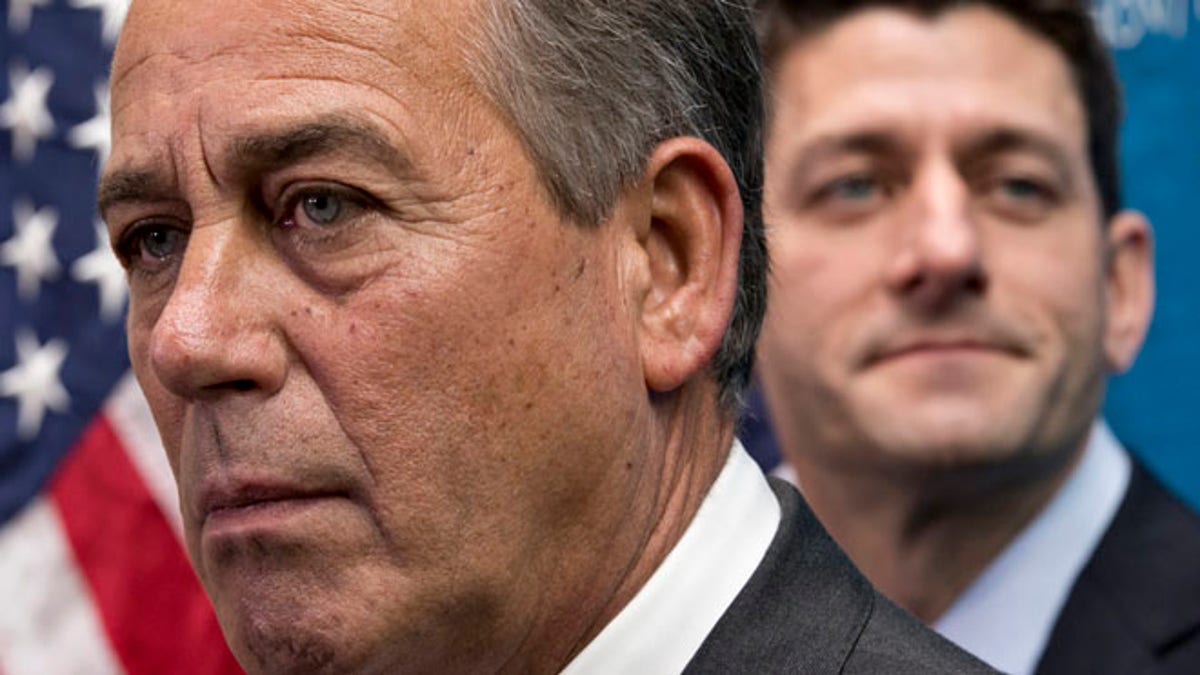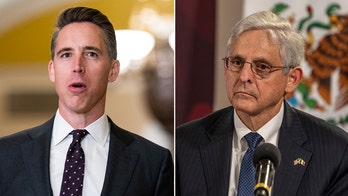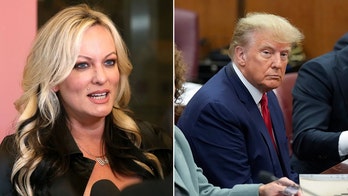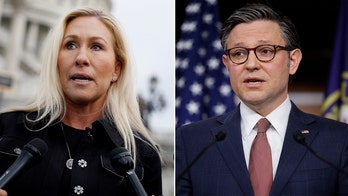
House Speaker John Boehner and House Budget Committee Chairman Rep. Paul Ryan, R-Wis., on Capitol Hill in Washington, Wednesday, Dec. 11, 2013 ((AP))
House Speaker John Boehner stepped into the ring with the conservative flank Wednesday, calling their complaints about the newly unveiled budget plan "ridiculous" as he teed up a vote on the bill.
The speaker was reacting to groups like FreedomWorks which have blasted the budget "deal" as a farce that jacks up spending in the short-term in exchange for promises of additional cuts years from now.
Boehner, trying to keep the complaints at bay long enough to win support for the plan in the House, lashed out at those organizations during a press conference Wednesday. Leaders plan a vote on Thursday and have voiced confidence that the bill will pass.
"They're using our members and they're using the American people for their own goals. This is ridiculous," he said. "Listen if you're for more deficit reduction, you're for this agreement."
But despite the fanfare surrounding Tuesday's budget unveiling, there was a steadily growing contingent of advocacy groups and lawmakers claiming the deal should not be approved.
Boehner's comments stoked that argument.
"Speaker Boehner's real problem here isn't with conservative groups like FreedomWorks, it's with millions of individual Americans who vote Republican because they were told the GOP was the party of small government and fiscal responsibility," FreedomWorks President Matt Kibbe said in a statement.
Club for Growth President Chris Chocola, in response to Boehner, cited Republican senators who have come out against the plan. "We stand with Marco Rubio, Ted Cruz, Tom Coburn, Rand Paul, members of the Republican Study Committee and every other fiscal conservative who opposes" the deal, he said.
Ranking Senate Budget Committee member Sen. Jeff Sessions also came out against the plan, saying he doesn't support numerous parts of the deal and it "was never formally considered, crafted, or voted upon by the conferees."
It's unclear whether the Republican infighting will translate to a problem with getting the votes on the House floor. Many Democrats, for their part, were unhappy the deal does not include an extension of long-term unemployment aid and are trying to get a vote to include it. Many Republicans groused that the tentative deal, while claiming $23 billion in net deficit reduction over the next decade, unravels a large chunk of the sequester cuts for the next two years.
However, a number of Republican and Democratic leaders lined up behind the plan, claiming it's a step in the right direction, eases the indiscriminate cuts of the sequester and -- perhaps most importantly -- sets in place a budget plan for the next two years and lifts the recurring threat of a partial government shutdown.
Lawmakers this time are facing a Jan. 15 deadline to pass a budget plan.
"We feel very good at where we are with our members," said Rep. Paul Ryan, R-Wis., who was the lead negotiator along with Sen. Patty Murray, D-Wash. "We know that this budget agreement doesn't come close to achieving what we want to achieve on our ultimate fiscal goals. But again, if we can get a step in the right direction, we're going to take that step."
The Obama administration also came out in support of the plan on Wednesday, urging Congress to pass it "in order to continue growing the nation's economy and creating jobs."
Boehner has long found himself struggling to strike a balance with the Tea Party-aligned wing of the party. He went along with their effort to challenge ObamaCare in the fall, standing by them for 16 days during the partial government shutdown. In the end, though, he had to rely on mostly Democrats to approve a short-term budget bill and break the impasse.
His comments Wednesday could reflect frustration with the prospect of going down that road once more.
The Republican rank-and-file will have to weigh both the impact on the country's fiscal future -- even less partisan groups like Taxpayers for Common Sense claimed the proposal lacked "real deficit reduction" -- and political considerations.
A couple of the big names coming out against the plan are considered potential GOP presidential candidates in 2016. And Senate Republican Leader Mitch McConnell quickly faced pressure from his primary rival, Matt Bevin, to oppose the plan.
"McConnell should lead Republicans in demanding a deal that, at a bare minimum, sticks to the existing savings of the sequester," Bevin said in a statement.




